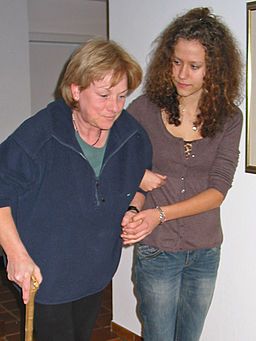Caregiving
A Workover: A Scientist/Professor Leaves to be a Caretaker
Advice I gave to a caller to my NPR-San Francisco radio program.
Posted June 1, 2015

On my NPR-San Francisco radio program, I do Workovers: Callers call in with a career-related problem. I've been posted edited transcripts of Workovers that might interest PsychologyToday.com readers. Here's today's offering:
CALLER: I’ve been a caregiver for a family member who is going to die in probably two to five years.
MN: That’s a lot to take on for so long. Are you committed to doing that?
CALLER: Absolutely.
MN: Okay. How can I help you?
CALLER: Until my family member got sick, I was a scientist and administrator. I want an idea for something I might do during these next few years that has flexible hours--because the person goes up and down. Something I can later use to get back into the workforce that’s less stressful because I’ve had enough stress to last a lifetime. And I want it to be enjoyable work. I’m willing to accept a significantly lower salary.
MN: When people step away from a high-level position to be a caretaker, often it's not just for the love of the ill person, For example, they might be unhappy with their career or are tired of working outside the home. Quitting to be a caretaker gives the person a socially acceptable reason to leave. Is that applicable to your situation?
CALLER: No. I was a college teacher and I was okay with it. It was because the family member really needed me.
MN: I want to probe one more time: Most people who had a nice job like college teacher, even though they love their family member, would hire help rather than quit their career. If you look into your soul, what really was going on?
CALLER: It really was the horror of what was happening to her and her inability to get the resources she needed—It’s so hard to do that when you’re ill. Because I was in the medical field, I was in a particularly good position to do it.
MN: Sad that it requires so much effort to get health care resources. Might this experience prepare you to do something related to that?
CALLER: It’s made me very critical of the medical care system.
MN: Okay. Have you ever been to the eye doctor and he or she asks you if you see better with lens 1 or 2 and after a while you can’t tell, and you feel stupid? I’m going to use that "1 or 2 technique" here to help us narrow to the right career prescription for you. How’s that sound?
CALLER: Good.
MN: Okay, would you rather be a personal health care advocate or a health policymaker?
CALLER: Health policymaker.
MN: Health policymaker or write a book about health care?
CALLER: Write a book about health care.
MN: A book called: A Caregiver’s Guide to (whatever disease it is your family member has) or Translating Doctorese?
CALLER: Translating Doctorese--if I felt I were a good enough writer. It feels risky.
MN: So would you like to float a trial balloon: Write an article-length version, perhaps with the help of an editor or even ghostwriter, and send it to 20 media outlets? That will give you a sense of whether the world is telling you to pursue it. And you’ll see if you’re feeling more or less excited about pursuing that sort of thing. How’s that feel?
CALLER: Great!


